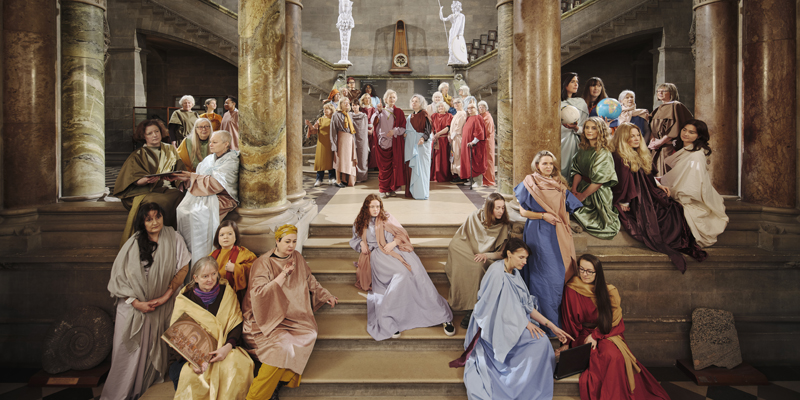In This Section
UCC professor features in female reboot of Raphael’s famous ‘School of Athens’ fresco

A new photographic portrait of 50 women leaders in Ireland, featuring University College Cork palaeontologist Professor Maria McNamara, has been unveiled at Trinity College Dublin.
Entitled the School of Hibernia, the image features an all-female cast of prominent artists, social activists, sports figures, and scholars, including first female Irish president, Mary Robinson; first woman president of the Royal Irish Academy, Mary E Daly; writer Melatu Uche Okorie; and consultant neurologist Professor Orla Hardiman. The re-creation of an icon of Renaissance art aims to challenge patriarchal attitudes to knowledge and education as well as the art history canon.
The portrait is a re-enactment of The School of Athens, a famous fresco painted by the classical artist Raphael in The Vatican between 1509 and 1511. The original fresco includes 50 male figures that represent important philosophers, mathematicians, and scientists of the day.
The painting is considered the quintessential symbol of classical knowledge and education during the Renaissance. It also endorsed the Greek educational system that persisted in Europe for centuries, whereby privileged white European men presided over educational directions and priorities for over 500 years. These male characters are replaced by women in the Irish portrait.
The tableau was staged on the day after International Women’s Day, on March 9th and was followed by round-table discussions on the meaning of "the academy" in the 21st century. The portrait will be the subject of a future documentary that will explore the project and will feature conversations with the women subjects and their ideas about education and social needs for now and the future.
Professor Maria McNamara, a palaeontologist in the School of Biological, Earth and Environmental Sciences at UCC, and a participant in the project, said: "This project highlights the transformative social change that Western society has seen since the painting of Raphael’s fresco. Five hundred years ago, it would have been unthinkable to consider the existence of female professors, sporting champions, politicians, and activists, let alone to gather them in one space and celebrate their achievements."
"This tableau project places social change and greater educational opportunities for women front and centre. The women participating in the event, however, spoke about shared ongoing challenges, including persistent tension between legacy societal expectations of women and career success and unequal treatment of women and men in both the workplace and in educational settings. Gender equity is still a goal and not a reality, so initiatives like this provide us with an important opportunity to take stock and consider the path to a more equal society,” added Professor McNamara.
The re-enactment was devised by the art collective Na Cailleacha and staged in collaboration with Trinity College Dublin's History of Art and Architecture Department in Trinity’s Museum Building. Art history and drama students from Trinity assisted in the staging and production.
Curator of Na Cailleacha Catherine Marshall explained: "We talk about the visibility of women a lot in the visual arts and are rightly critical of the art historical canon. Raphael’s School of Athens fresco is a powerful illustration of how pervasive patriarchy is in all aspects of life. We decided to bring living women together to celebrate all the ways in which they have challenged history. We wanted it to be fun as well as provocative. To our delight, Trinity offered a location with ready made history and architecture and these great women did the rest."
